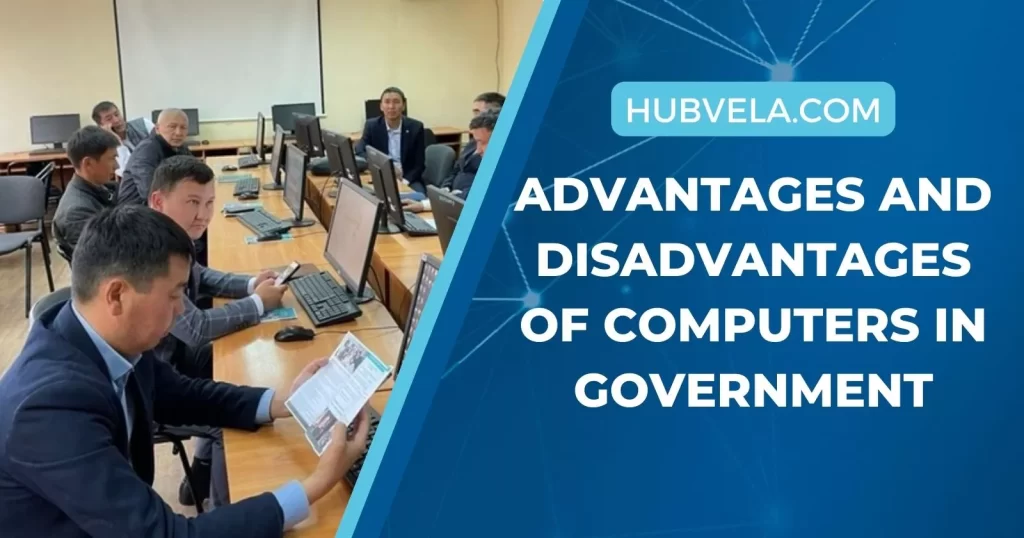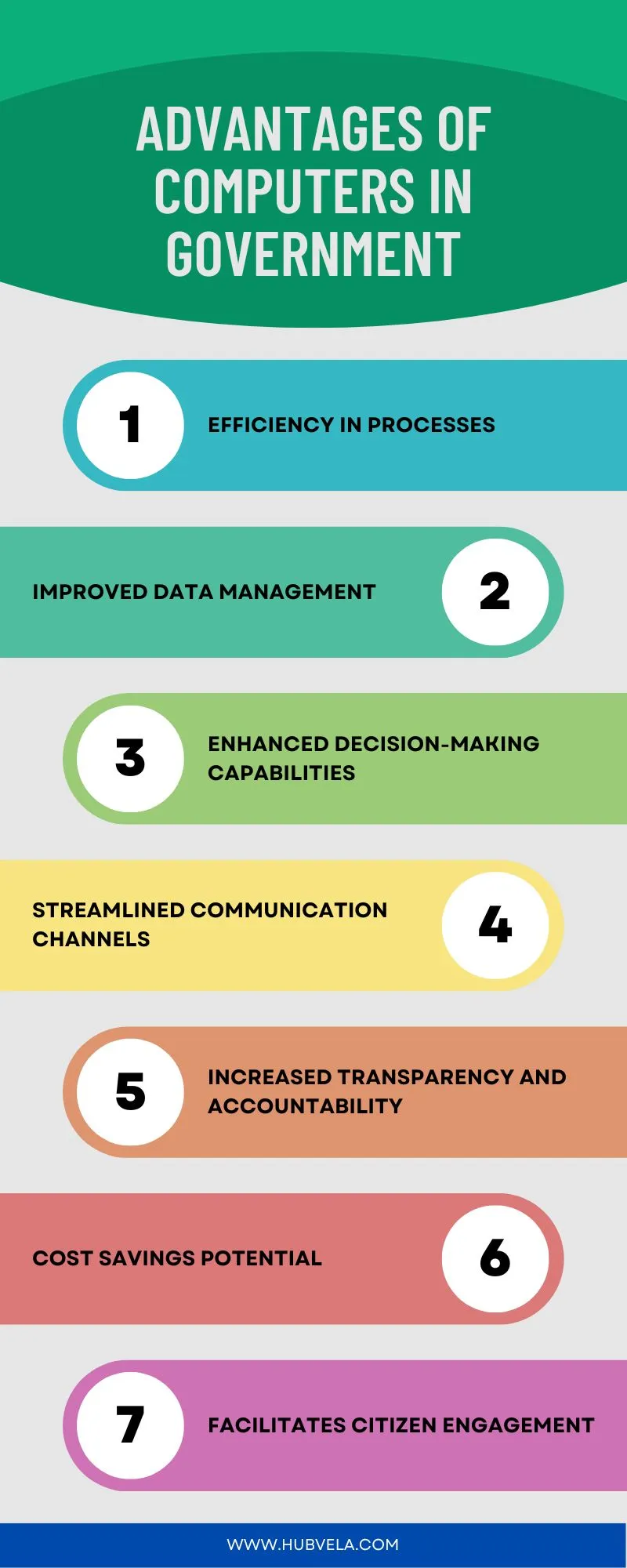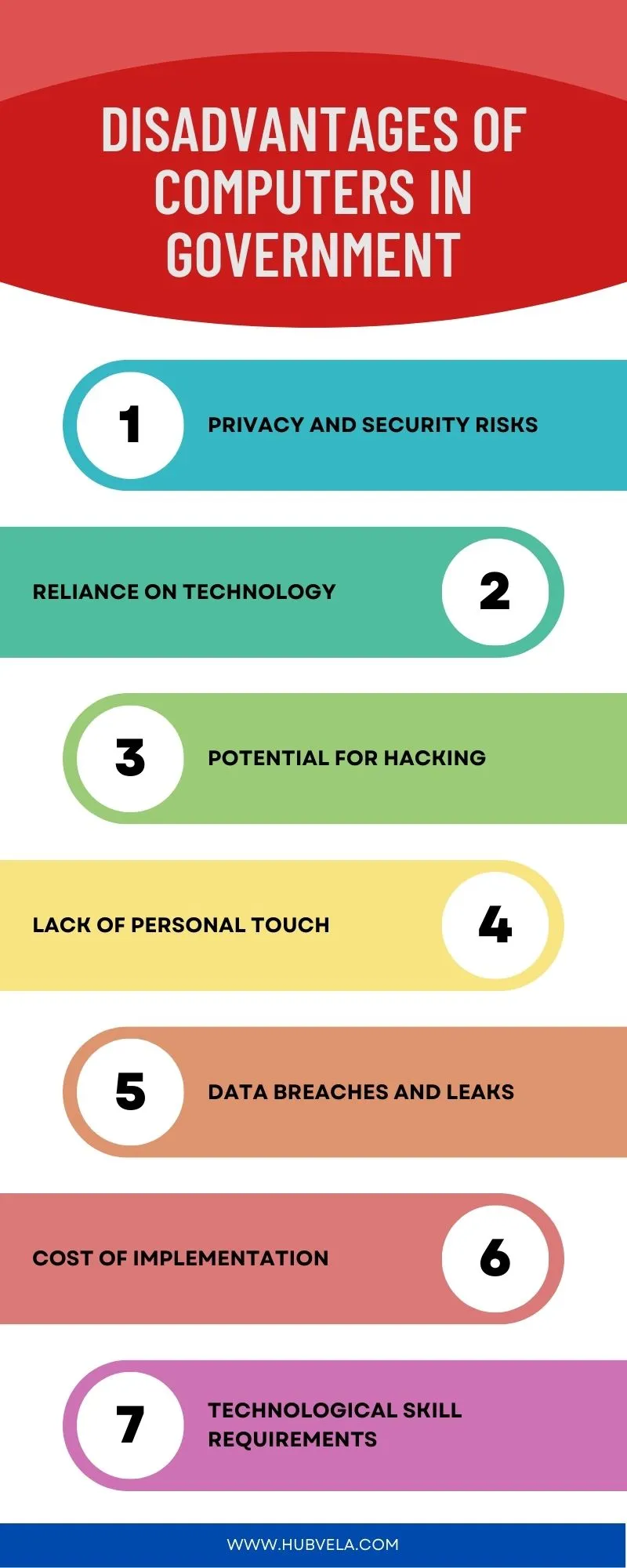Are you curious about the advantages and disadvantages of computers in government? Well, let’s dive in!
Imagine a government agency that has implemented computer systems to streamline its processes. This has resulted in increased efficiency, improved data management, and enhanced decision-making capabilities. Communication channels have also been streamlined, allowing for better collaboration among government officials.
However, there are also downsides to consider. Data breaches and leaks pose a significant risk, and the cost of implementing and maintaining computer systems can be quite high. Additionally, the need for technological skills may create a barrier for some government employees.
In this introduction, we will explore both the advantages and disadvantages of using computers in government, helping you understand the potential benefits and challenges involved.

--Advertisement--
Advantages of Computers in Government
The use of computers and digital technologies in government services has brought numerous advantages, improving the efficiency, accessibility, and transparency of public services. Some of the key benefits of computers in government include:

1. Efficiency in Processes
By utilizing modern computer systems, you can significantly improve the efficiency of government processes.
Process automation, one of the advantages of computers in government, eliminates the need for manual tasks, saving valuable time. With automated processes, tasks that would have taken hours or even days to complete can now be done in a matter of minutes.
Additionally, computers enable improved accuracy in government processes. By eliminating human error, computers ensure that data is entered correctly, reducing the risk of mistakes and inaccuracies.
Moreover, computers facilitate data integration, allowing different departments and agencies to access and share information easily. This streamlines processes and promotes collaboration.
Lastly, computers help optimize resources by enabling better resource management and allocation, contributing to overall efficiency in government operations.
2. Improved Data Management
With computers, you can effectively enhance data management in government through improved organization and accessibility. The use of computers allows for efficient governance by enabling data analysis, which aids in making informed decisions.
Digital records can be easily stored, retrieved, and shared, reducing the need for large physical storage spaces. This not only saves time but also promotes a more sustainable and eco-friendly approach.
Additionally, computers can ensure data protection by implementing security measures such as encryption and access controls. This helps to safeguard sensitive information from unauthorized access or data breaches.
Furthermore, computers contribute to data accuracy by minimizing human errors and providing automated checks and validations.
3. Enhanced Decision-Making Capabilities
Improve your decision-making capabilities in government through the enhanced use of computers. By utilizing advanced technologies and software, computers offer numerous benefits to decision making in the government sector.
One of the key advantages is the ability to conduct thorough analysis of complex data sets. Computers can quickly process and analyze large amounts of information, enabling policymakers to make informed decisions based on accurate and up-to-date data. This enhances the efficiency and effectiveness of decision-making processes, as it eliminates the need for manual data processing and reduces the risk of errors.
Additionally, computers can provide real-time monitoring and forecasting, allowing government officials to anticipate and respond to potential challenges and opportunities more effectively.
4. Streamlined Communication Channels
Utilize computers to streamline communication channels in government and enhance efficiency.
By implementing advanced technology, such as computers and internet connectivity, government agencies can achieve improved connectivity and effective collaboration among different departments. This allows for streamlined operations and the exchange of real-time information.
With computers, government officials can communicate more efficiently, reducing the need for time-consuming and costly methods such as physical meetings or paper-based memos. This streamlined communication enables faster and more efficient decision-making processes, as relevant information can be shared and accessed instantly.
Additionally, computers enable the creation of centralized databases and communication platforms, facilitating the sharing of information across departments and eliminating the need for multiple, disconnected systems.
5. Increased Transparency and Accountability
By implementing computers, government agencies can enhance transparency and accountability in their operations. The use of computers in government can bring about several transparency benefits.
For instance, computers enable the efficient management and storage of data, making it easily accessible to the public. This increased data accessibility allows citizens to monitor government actions and hold officials accountable for their decisions.
Moreover, computers facilitate information sharing among different government agencies, ensuring better coordination and collaboration.
However, while computers can improve transparency, they also present challenges to accountability. Government agencies must ensure the security and integrity of data stored on computers to maintain public trust.
Additionally, the use of computers may require government officials to be more diligent in documenting and tracking their actions to ensure transparency and accountability are upheld.
6. Cost Savings Potential
You can often save costs by using computers in government. The savings potential of utilizing technology in government operations is significant.
Computers allow for operational improvements, such as streamlining processes and reducing paperwork, which can lead to resource optimization and increased efficiency. By automating tasks and implementing digital systems, government agencies can allocate their budgets more effectively. This allows for better financial efficiency and the ability to prioritize important projects and initiatives.
Computers also enable remote work and telecommuting, reducing the need for physical office space and associated costs. With the integration of technology into government operations, there’s a great potential for cost savings and improved financial management, ultimately benefiting both the government and its citizens.
7. Facilitates Citizen Engagement
Computers in government facilitate citizen engagement by enhancing communication and participation. Through the use of online platforms and e-governance initiatives, citizens can actively participate in the decision-making processes and contribute to the development of policies.
This digital democracy allows for greater citizen participation and civic engagement, as individuals can easily access and provide feedback on government initiatives. Online forums and social media platforms provide a space for citizens to voice their opinions, share ideas, and collaborate with others.
Furthermore, e-governance initiatives streamline administrative processes, making it easier for citizens to interact with government services and access information.
Disadvantages of Computers in Government
The use of computers and digital technology in government services has brought numerous advantages, such as improved efficiency, better communication, and increased transparency. However, there are also disadvantages to relying heavily on computers and the Internet, which include:

1. Privacy and Security Risks
Government computers pose significant privacy and security risks. With the increasing reliance on computers and technology, privacy concerns have become a major issue for governments worldwide.
Cyber threats have become more sophisticated, making it essential for governments to prioritize data protection. The use of surveillance technologies raises concerns about invasion of privacy and potential misuse of information. Encryption technologies have been developed to safeguard sensitive data, but they aren’t foolproof and can be vulnerable to hacking attempts.
Government agencies must constantly update their security measures and invest in advanced technologies to mitigate these risks. It’s crucial to strike a balance between the benefits of using computers in government operations and the potential dangers they pose to privacy and security.
2. Reliance on Technology
You should be aware of the risks associated with relying heavily on technology in government operations. While computers have brought numerous advantages to the government, there are also disadvantages that come with overreliance on technology.
One of these disadvantages is the impact on the job market. As more processes become automated, there’s a potential for job loss, especially for those in administrative roles.
Additionally, the digital divide becomes more apparent when governments rely solely on technology. Those without access to computers or the internet are left at a disadvantage.
Furthermore, the potential for errors increases as governments become more dependent on data. If there’s a glitch in the system or a cyber attack, the entire operation could suffer.
It’s essential for governments to be cautious and strike a balance between utilizing technology and maintaining human oversight to mitigate these risks.
3. Potential for Hacking
To understand the potential for hacking, it’s important to recognize the significant threat that cyber attacks pose to government computer systems. Government agencies store a vast amount of sensitive information, making them attractive targets for hackers. The potential risks associated with cyber attacks include data compromise, vulnerability issues, and hacking threats.
With the advancement of technology, hackers are constantly finding new ways to exploit weaknesses in computer systems, leaving government networks vulnerable to infiltration. A successful cyber attack on government systems can have severe consequences, including the theft of classified information, disruption of critical services, and even national security threats.
Therefore, it’s crucial for governments to invest in robust cybersecurity measures to protect against these potential risks and mitigate the impact of hacking threats.
4. Lack of Personal Touch
With the increasing reliance on computers in government, the personal touch in interactions with citizens is diminishing. Personal interaction and human connection are crucial in fostering trust and understanding between government officials and the public.
However, face to face communication is being replaced by impersonal digital platforms, leading to a decline in the quality of interpersonal relationships. Emotional intelligence, which is essential for effective governance, can’t be fully conveyed through technology alone.
The lack of personal touch hinders the government’s ability to empathize with citizens and address their concerns adequately. It’s important to remember that behind every computer screen, there are real people with real emotions and needs.
Striking a balance between technology and personal interaction is necessary to maintain a strong connection between the government and its citizens.
5. Data Breaches and Leaks
Data breaches and leaks pose a significant risk to the security and integrity of government computer systems. With the increasing reliance on technology and the digital storage of sensitive information, data privacy has become a critical concern.
Cyber attacks targeting government systems can result in the exposure of classified data, jeopardizing national security and individual privacy. The importance of data protection and information security can’t be overstated in the face of these threats.
Governments must invest in robust breach prevention measures to safeguard against unauthorized access and leakage of sensitive information. Regular security audits, employee training, and the implementation of advanced encryption techniques are essential to mitigate the risks associated with data breaches and leaks.
6. Cost of Implementation
Implementing computers in government comes with the disadvantage of incurring significant costs. The process of implementing computer systems can be challenging due to various factors.
One of the main challenges is the budget constraints that government agencies often face. Allocating funds for the purchase of hardware, software, and necessary infrastructure can be a daunting task. Additionally, training requirements can add to the overall cost. Government employees need to be trained on how to use the new technology effectively.
Ensuring hardware compatibility with existing systems can also be a costly endeavor, as it may require upgrading or replacing outdated equipment.
Lastly, long-term sustainability is another aspect that needs to be considered when implementing computers in government. Regular maintenance and updates are necessary to keep the systems running smoothly, which can add to the overall cost of implementation.
7. Technological Skill Requirements
To effectively utilize computers in government, you must possess a high level of technological proficiency. Technological advancements have transformed the way governments operate, but they’ve also created a digital divide.
Many government employees may struggle to adapt to new technologies and lack the necessary digital literacy skills. This can hinder their ability to fully utilize the benefits of computers in government operations. Workforce development programs that focus on enhancing technological skills are crucial to bridge this gap.
Additionally, the rise of remote work in the government sector requires employees to be proficient in using digital tools and platforms to collaborate effectively. By investing in training and promoting digital literacy, governments can ensure that their employees are equipped with the necessary skills to navigate the digital landscape and maximize the potential of computers in government.
Conclusion on Advantages and Disadvantages of Computers in Government
In weighing the pros and cons, it’s clear that computers play a crucial role in government operations. The impact of computers on governance has been significant, leading to a digital transformation in many government departments.
The advantages of using computers in government include increased efficiency, improved data management, and enhanced decision-making processes. However, there are also challenges faced when implementing computer systems, such as cybersecurity concerns, data privacy issues, and the need for technological skill development among government employees.
As governments continue to rely more on computers, it’s crucial to address these challenges and consider the future implications. Future considerations should include investing in cybersecurity measures, ensuring data privacy, and providing adequate training for government employees to adapt to technological advancements.


